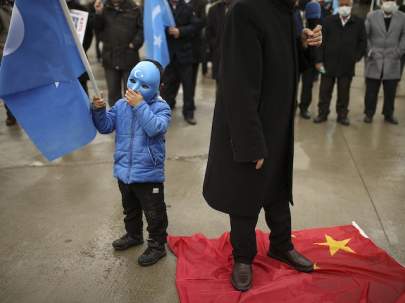Report: China’s Destruction of Uyghur People the ‘First Technology-Enabled Genocide’

The World Uyghur Congress (WUC), an international organization headquartered in Germany, on Tuesday released the 2020 edition of its annual Human Rights Report.
The WUC described its report as “a detailed review of China’s egregious crimes against the Uyghurs and other Turkic people.”
“Uyghurs have been facing the most serious crimes in the past few years, which amount to genocide. It’s currently one of the most urgent human rights crises in the world,” WUC president Dolkun Isa said.
The report found Communist China’s abuse of the Uyghurs in Xinjiang province, which the Uyghurs prefer to call East Turkistan, intensified in 2020.
The crackdown included “systematic destruction of Uyghur culture and religion, forced sterilizations, abortions, and other birth prevention measures, State-corporate nexus in the exploitation of Uyghur forced labour, and large-scale use of digital surveillance and big data – so much so that the Uyghur genocide can safely be described as the first technology-enabled genocide.”
Like many other human rights advocates, the WUC said the coronavirus pandemic was used by China as a pretext for tightening its authoritarian grip.
The WUC said:
Governmental authorities imposed sudden and arbitrary lockdowns, sprayed Uyghurs with corrosive chemicals, created artificial food shortages, and forced Uyghurs to ingest dubious medicines. Furthermore, Uyghur forced labour was being utilized to produce safety equipment and disposable masks for the rest of the world.
The report went into disturbing detail about the sudden and harsh lockdown of the Uyghur capital city of Urumqi during the pandemic, imposed without warning so the residents had no time to stockpile food or medicine. Lockdown violators were subjected to highly abusive punishments, with one woman reporting she was stripped naked and hosed down with “scalding” disinfectant every week by guards at a detention facility.
The WUC cited disturbing reports that Uyghurs were forced to consume unidentified, untested Chinese “herbal remedies” during the pandemic. Some were forced to film themselves taking the pills to satisfy their Chinese captors.
China’s treatment of the Uyghurs also grew harsher in 2020 as the Chinese government grew apprehensive about Islamic terrorism spreading through Europe and potentially erupting from Afghanistan after American military withdrawal. Chinese authorities treated “religious extremism” as a contagious disease on par with the coronavirus.
The WUC charged China with trying to erase the Uyghur’s cultural heritage and religious faith, in addition to physically confining and eliminating them with concentration camps, sterilization, and forced abortions.
“Reports have indicated that over two-thirds of the region’s mosques have been affected and about half of the protected cultural sites have been damaged or destroyed. The Uyghur language and religious practices are also at a heightened risk of disappearance as they have been prohibited in large parts of East Turkistan,” the report warned.
The WUC recounted the experiences of numerous Uyghurs detained without proper legal procedure, condemned to the hellish concentration camps of Xinjiang, subjected to abuse and sexual violence, used for slave labor, and forcibly sterilized.
A large chapter of the report discussed China’s slavery policies, pushing back against Beijing’s insistence no such policies exist by quoting official documents revealing the existence of “a large-scale government plan, known as the ‘mutual pairing assistance program,’ for companies from various parts of China to establish satellite factories in East Turkistan in conjunction with the concentration camps.”
The WUC charged that Chinese corporations and local governments are reaping windfalls from training and supplying Uyghur labor, while the workers themselves receive “minimal or no compensation.” Some Chinese companies are eagerly moving production facilities to Xinjiang to profit from slavery, while the government ships many other Uyghurs off to factories across China, housing them in prison-like dormitories.
Uyghur efforts to speak out about their abuse run into China’s vast censorship apparatus, which is especially harsh toward oppressed minorities. The WUC report listed Uyghur activists and journalists jailed under vague charges of separatism or being “two-faced” – a seemingly childish phrase the Chinese Communist Party employs to equate dissent with treason.
China uses vast amounts of surveillance technology and data processing to monitor the Uyghurs, harvesting everything from their text messages to their DNA. A massive Chinese computer system flags Uyghurs who engage in “problematic behaviors” ranging from religious practice to merely communicating with people overseas. The Chinese system also targets anyone who tries to escape from electronic surveillance by going “off the grid.”
The WUC expressed concerns China is moving to block Uyghurs from escaping its grasp and recapture those who fled to other countries, offering examples such as China’s extradition treaty with Turkey – a country that has softened its criticism of China after huge loans and investments from Beijing.
On the other hand, the WUC report saluted the growing number of countries that have taken “a firm stand against the Chinese government by increasingly speaking out against the Uyghur genocide and imposing concrete sanctions and restrictions on Chinese individuals and entities,’ including the U.S., U.K., European Union, Australia, Japan, and some Muslim countries.”
On Tuesday, the WUC was among the human rights groups calling for a boycott of the Beijing Olympics in February 2022.
The WUC’s Zumretay Arkin asked athletes to “put themselves in our shoes” and understand that while they might “lose one Olympic Game,” the Uyghurs have “lost entire families, and relatives, and friends.”
“I think it’s important for them to use the power they have, because athletes are not just puppets that the IOC [International Olympic Committee] or governments can just control,” Arkin said.
Soure: https://www.breitbart.com/national-security/2021/05/19/report-chinas-destruction-uyghur-people-first-technology-enabled-genocide/




